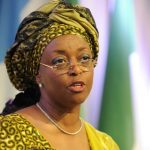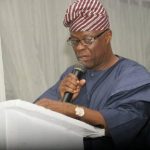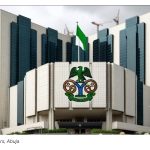Economy
14 Nigerian States Bankrupt—Report
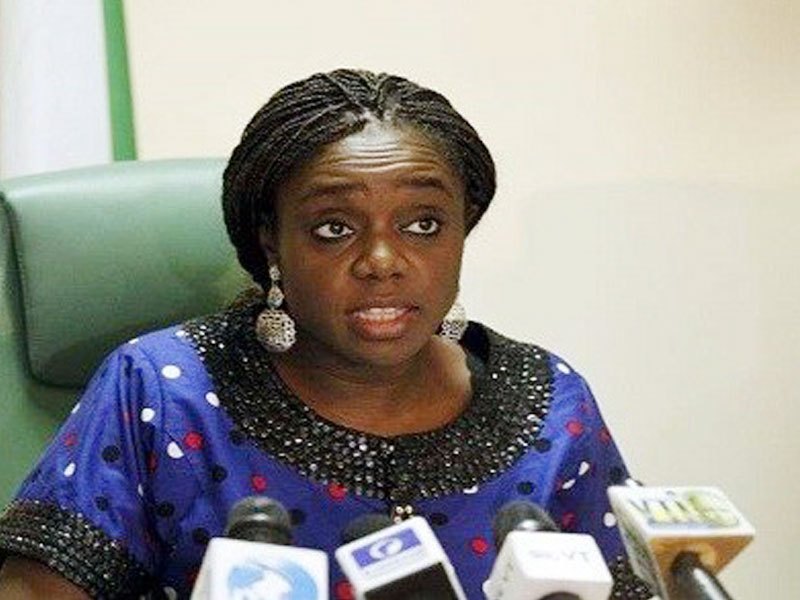
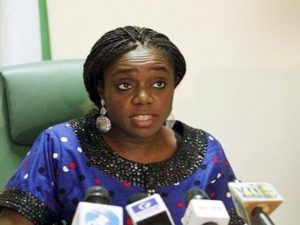
By Modupe Gbadeyanka
Out of the 36 states of the federation, 14 of them are insolvent as their Internally Generated Revenues (IGR) in 2016 were far below 10 percent of their Federation Account Allocations (FAA) in the same year, a new report has disclosed.
The report, released by the Economic Confidential, the award winning Economic Intelligence Magazine, noted that without the monthly disbursement from the Federation Account Allocation Committee (FAAC), many states in the country would find it very difficult to survive.
Economic Confidential, in its Annual States Viability Index (ASVI), pointed out that the index was carefully and painstakingly computed.
According to the magazine, the IGR are generated by states through Pay-As-You-Earn Tax (PAYE), Direct Assessment, Road Taxes and revenues from Ministries, Departments and Agencies (MDA)s. The report by this economic intelligence magazine further indicates that the IGR of Lagos State of N302 billion is higher than that of 30 States put together excluding Lagos, Ogun, Rivers, Edo, Kwara and Delta States, whose IGRs are very impressive at more than 30 percent each. The 30 other states merely generated a total of N258 billion in 2016.
Recently the magazine published the total allocation received by each state in Nigeria from the Federation Account Allocation (FAA) between January to December 2016. The latest report on IGR reveals that only Lagos and Ogun States generated more revenue than their allocations from the Federation Account by 169 percent and 127 percent respectively and no any other state has up to 100 percent of IGR to the federal largesse.
The IGR of the 36 states of the federation totalled N801.95 billion in 2016 as compared to N682.67 billion in 2015, an increase of N119.28 billion.
While the report provides shocking discoveries to the effect that 14 states which have less than 10 percent IGR may not stay afloat outside the Federation Account Allocation due to socio-political crises including insurgency, militancy and herdsmen attacks, others lack foresight in revenue generation drive coupled with arm-chair governance.
The states that may not survive without the Federation Account due to poor internal revenue generation include Borno which realized a meagre N2.6 billion compared to a total of N73.8 billion it received from the Federation Account Allocation (FAA) in 2016 representing about 4 percent.
Others are: Ebonyi with IGR of N2.3 billion compared to FAA of N46.6 billion representing 5 percent; Kebbi N3.1 billion compared to FAA of N60.88 billion representing 5.14 percent; Jigawa with N3.5 billion compared to N68.52 billion of FAA representing 5.15 percent and Yobe with IGR of N3.24 billion compared to N53.93 billion of FAA representing 6.0 percent within the period under review. Other poor internal revenue earners are Gombe which generated N2.94 billion compared to FAA of N46 billion representing 6.26 percent; Ekiti N2.99 billion compared to FAA of N47.56 billion representing 6.28 percent; Katsina N5.54 billion compared to FAA of N83 billion representing 6.65 percent and Sokoto N4.54 billion compared to FAA of N65.97 billion representing 6.88 percent.
Meanwhile Lagos State remained steadfast in its number one position in IGR with a total revenue generation of N302 billion compared to FAA of N178 billion which translate to 169 percent in the twelve months of 2016.
It is followed by Ogun State which generated IGR of N72.98 billion compared to FAA of N57 billion representing 127 percent. Others with impressive IGR include Rivers with N85 billion compared to FAA of N134 billion representing 63 percent; Edo with IGR of N23 billion compared to FAA of N59 billion representing 38 percent. Kwara State however with low receipt from the Federation Account has greatly improved in its IGR of N17bn compared to FAA of N49 billion representing 35 percent while Delta with IGR of N44 billion compared to FAA of N126 billion representing 6.88 percent.
The Economic Confidential ASVI further showed that only three states in the entire Northern region have IGR above 20 percent. They are Kwara, Kano, and Kaduna States.
Meanwhile eight states in the South recorded over 20 percent IGR in 2016. They are Lagos, Ogun, Rivers, Edo, Delta, Cross River, Enugu, and Oyo States State. The states with the poorest Internally Generated Revenue of less than 10 percent in the South are Imo, Bayelsa, Ekiti, and Ebonyi States while in the North we have Niger, Nasarawa, Sokoto, Katsina, Gombe, Yobe, Jigawa, Kebbi and Borno States.
Meanwhile the IGR of the respective states can improve through aggressive diversification of the economy to productive sectors rather than relying on the monthly Federation Account revenue that largely come from the oil sector.
Source: Economic Confidential
Economy
Stanbic IBTC Insurance Triumphs at 2025 Risk Analyst Awards
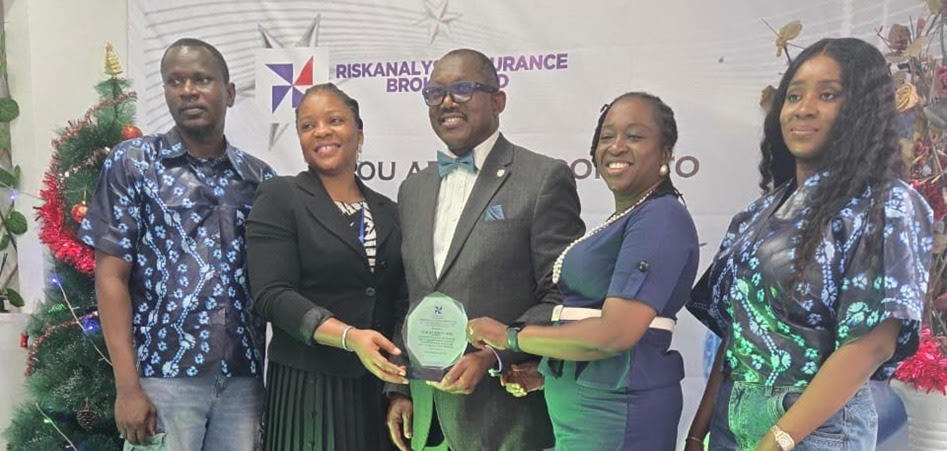
By Modupe Gbadeyanka
A subsidiary of Stanbic IBTC Holdings Plc, Stanbic IBTC Insurance, has continued to showcase institutional excellence, becoming one of Nigeria’s top-performing insurers.
At the 2025 Risk Analyst Insurance Brokers Performance Review Awards, the underwriting firm won the Life Insurance category for its operational discipline, prompt claims settlement, and partnership-driven approach that fosters long-term confidence with clients and brokers.
The organisers were impressed with the company’s performance in life insurance, which reflects the broader institutional direction of Stanbic IBTC Holdings, which is building resilient, trusted, and high-performing financial institutions that contribute to Nigeria’s economic growth and the development of the insurance sector.
“At Stanbic IBTC Insurance, trust is built through reliable performance, timely claims settlement, and service that supports customers when it matters most. This recognition reflects the quality of service we provide for our clients and partners.
“We are honoured to receive this accolade and will continue to raise standards across the industry,” the chief executive of Stanbic IBTC Insurance, Akinjide Orimolade, stated.
Also commenting, the chief executive of Stanbic IBTC Holdings, Mr Chuma Nwokocha, said, “We are proud of this achievement, which highlights the strength of our insurance business and the broader Stanbic IBTC Group’s focus on building strong, enduring institutions.
“Stanbic IBTC Insurance continues to set benchmarks in professionalism, client service, and operational excellence; reinforcing our role as a trusted partner to individuals and businesses across Nigeria.”
Every year, Risk Analyst Insurance Brokers Limited, which organises the event, carries out an annual assessment of insurance underwriters by evaluating partners based on key criteria, including claims settlement efficiency, service delivery, responsiveness, and broker–underwriter collaboration.
The initiative aims to promote accountability, raise service standards, and strengthen trust across Nigeria’s insurance ecosystem.
The 2025 performance of Stanbic IBTC Insurance highlights its role as a dependable and credible underwriting partner in the market.
Economy
Lagos Unveils Roadmap to Establish West Africa’s International Financial Hub
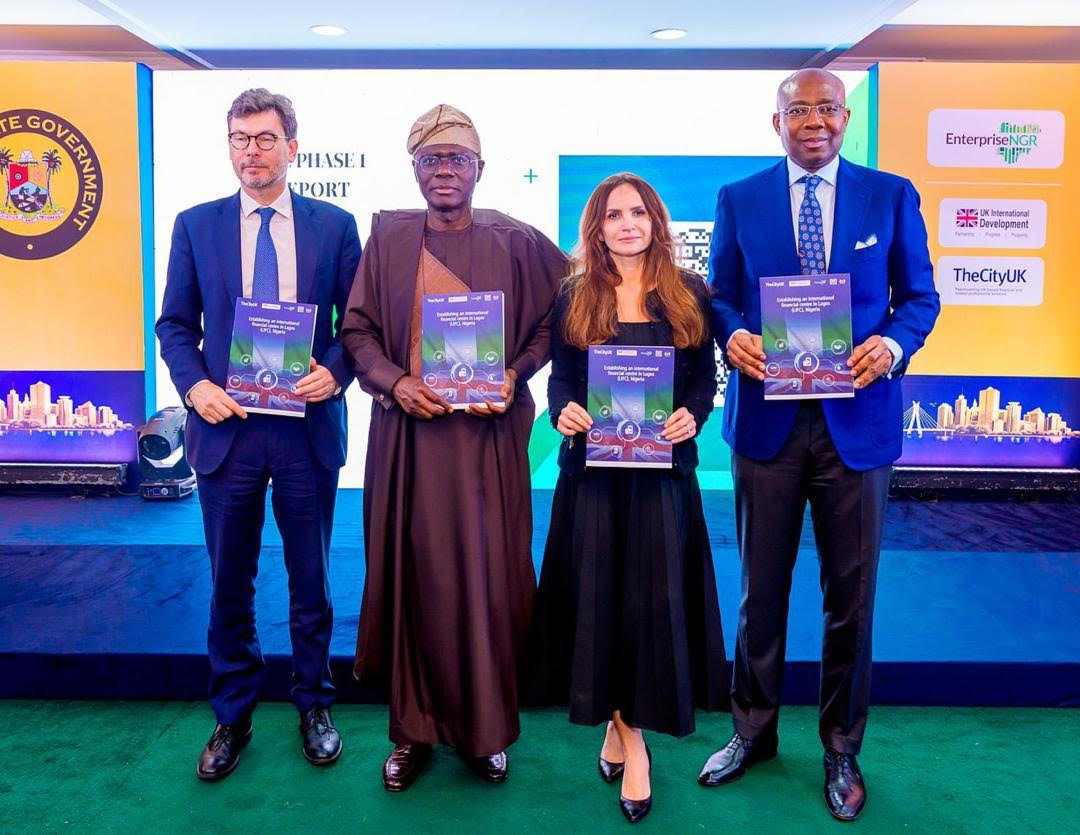
By Adedapo Adesanya
Nigeria’s commercial nerve centre, Lagos State, has announced plans to establish West Africa’s premier International Financial Centre to unlock international investment, innovation, and sustainable growth.
TheCityUK, in partnership with the UK Government, Lagos State Government, Lagos International Financial Centre Council (LIFCC), and EnterpriseNGR, on Monday unveiled a landmark report, Establishing an International Financial Centre in Lagos (LIFC), Nigeria, outlining a strategic roadmap to achieve the goal.
The establishment of a Lagos International Financial Centre aligns with Nigeria’s Agenda 2050 and the Lagos State Development Plan 2052 to deliver long-term economic prosperity, deepen financial markets, and attract productive global investment.
According to a statement, the project is hinged on a public-private partnership bringing visionary leadership from the government together with private sector companies seeking to tap into Nigeria’s young, dynamic market to deliver economic growth.
The unveiling was done at the State House Marina with guests including Lagos State Governor, Mr Babajide Sanwo-Olu, British Deputy High Commissioner Mr Jonny Baxter, and EnterpriseNGR Board Chairman and CEO, Mr Aigboje Aig-Imoukhuede and Mr Obi Ibekwe.
Lagos International Financial Centre Council will support Nigeria’s ambition to become an upper-middle-income country by 2050, driving inclusive growth, reducing poverty, and creating high-value jobs, especially for Nigeria’s talented youth, as per the report, adding that it will benefit from the strong UK-Nigerian co-operation, building on best practices and global benchmarks to align the LIFC with international standards.
The report proposes creating an independent International Financial Centre in Lagos to enhance regulatory clarity, simplify tax and policy frameworks, and boost investor confidence. It recommends an initial focus on Green and Sustainable Finance, FinTech and Innovation, and Commodities and Capital Markets, supported by strong governance, legal reforms, stakeholder collaboration, and targeted talent development.
Speaking on this, Governor Sanwo-Olu said, “Lagos is fully committed to the birth of the International Financial Centre. We know that it is a veritable means of supporting seamless trading and to enhance competitiveness of financial markets.
“As Nigeria’s largest economic and financial centre, Lagos plays a critical role in driving the nation’s capital markets. We need to create an ecosystem that will help to facilitate investment flows, enhance market liquidity, and promote financial literacy.
“The LIFC initiative will not only strengthen our market infrastructure but also unlock new opportunities for public-private partnerships in technology and capital market development. It will support seamless trading, attract foreign investment and enhance the competitiveness of financial markets.”
On his part, Mr Jonny Baxter, British Deputy High Commissioner, commented, “The launch of the Lagos International Financial Centre report reflects the deepening of the UK-Nigeria partnership, combining Lagos’s comparative strengths with UK expertise. Anchored in clear, evidence‑based analysis and launched at a pivotal moment in Nigeria’s reform journey, the LIFC has the potential to unlock major domestic and international investment, deepen capital markets, create jobs, and drive sustainable economic growth across the country, not just in Lagos State.”
Mrs Nicola Watkinson, Managing Director, International, TheCityUK, said, “Nigeria is a high-growth, dynamic and large market and the Lagos International Financial Centre could be vital to its future. By building a modern, integrated business and regulatory environment and financial ecosystem, the LIFC will support the attraction of global and domestic capital, deepen domestic markets, facilitate innovation in FinTech and green finance, and create high‑value jobs for Nigeria’s youth.
“Supporting the development of Lagos as an international financial centre is a clear example of how the UK and Nigeria are deepening their strategic partnership.”
Economy
Nigeria Now Consolidating Reforms for Economic Stability—Edun
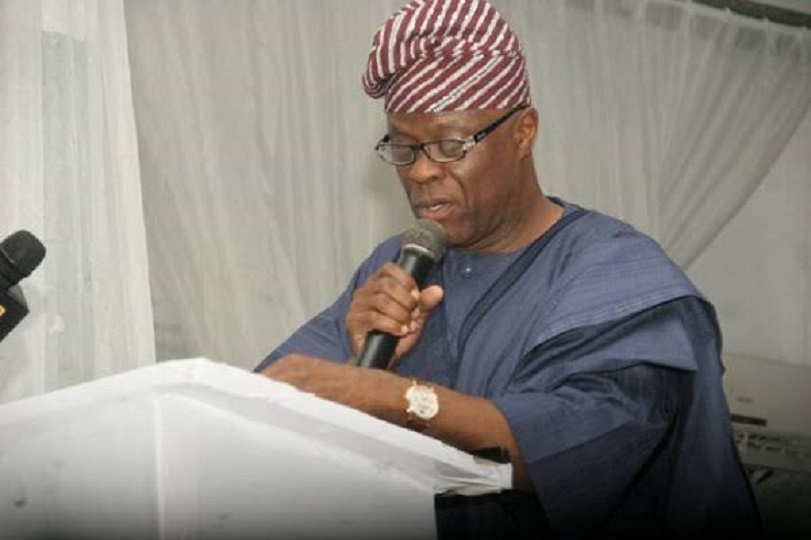
By Adedapo Adesanya
The Minister of Finance and Coordinating Minister of the Economy, Mr Wale Edun, has stressed that Nigeria was now consolidating its macroeconomic reforms to sustain economic stability in an increasingly volatile global environment.
The Minister spoke at a high-level panel on Fiscal Policy in a Shock – Prone World at the ongoing Al Ula conference for Emerging Market Economies in Riyadh, Saudi Arabia.
“Nigeria’s macroeconomic and fiscal reforms are working. Momentum must be maintained, and the benefits channelled towards long-term growth and resilience,” he stated.
He said the government is also leveraging digital tools to improve revenue assurance, while deepening fiscal and monetary coordination and promoting realistic budgeting practices to ensure durable fiscal discipline.
He noted that despite accounting for a significant share of global growth, population and natural resources, emerging economies remain under-represented in global financial decision-making.
Mr Edun also highlighted the growing strategic importance of Gulf nations in the evolving global economic landscape.
He said countries in the Gulf are increasingly shaping global trade routes, investment flows and sources of capital, making them critical partners for emerging economies such as Nigeria.
The finance minister stressed Nigeria’s commitment to building stronger partnerships that promote a more inclusive and equitable global financial system.
He said Nigeria was positioning itself to engage constructively with global partners to support reforms that unlock growth, stability and shared prosperity.
Mr Edun’s call comes amid mounting global economic pressures. Many emerging economies are grappling with high debt levels, elevated inflation, volatile capital flows and tightening global financial conditions.
Rising interest rates in advanced economies have increased debt-servicing costs, while currency volatility has strained fiscal and external balances across Africa and other developing regions.
Global trade is also facing increased fragmentation due to geopolitical tensions, supply chain disruptions and protectionist tendencies.
These trends have disproportionately affected emerging markets that depend heavily on trade, foreign investment and access to international finance.
For Nigeria, the push for a global economic reset aligns with ongoing domestic reforms aimed at stabilising the macroeconomic environment.
The country has embarked on exchange rate reforms, fiscal consolidation and efforts to attract long-term investment to support growth and job creation.
Mr Edun has repeatedly argued that without reforms to the global financial system, domestic policy efforts in emerging economies risk being undermined by external shocks.
At the Al Ula conference, he reiterated that a more balanced global system would enhance resilience, improve access to finance and support sustainable development.
He said Nigeria would continue to engage in global policy conversations to ensure that emerging economies are not only rule-takers but active shapers of the new global economic order.
-

 Feature/OPED6 years ago
Feature/OPED6 years agoDavos was Different this year
-
Travel/Tourism9 years ago
Lagos Seals Western Lodge Hotel In Ikorodu
-

 Showbiz3 years ago
Showbiz3 years agoEstranged Lover Releases Videos of Empress Njamah Bathing
-

 Banking8 years ago
Banking8 years agoSort Codes of GTBank Branches in Nigeria
-

 Economy3 years ago
Economy3 years agoSubsidy Removal: CNG at N130 Per Litre Cheaper Than Petrol—IPMAN
-

 Banking3 years ago
Banking3 years agoSort Codes of UBA Branches in Nigeria
-

 Banking3 years ago
Banking3 years agoFirst Bank Announces Planned Downtime
-

 Sports3 years ago
Sports3 years agoHighest Paid Nigerian Footballer – How Much Do Nigerian Footballers Earn



